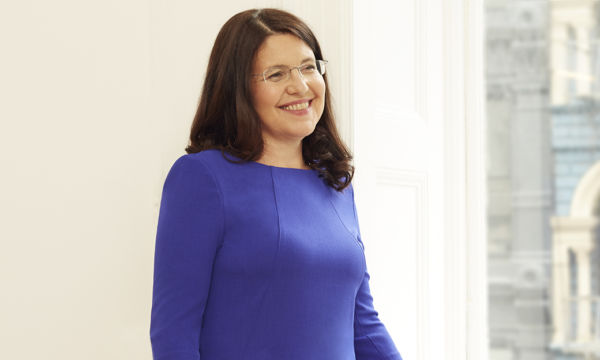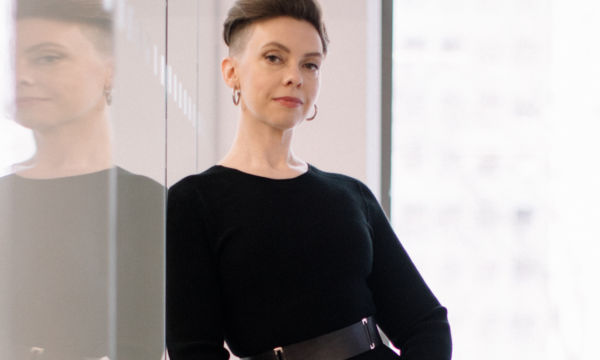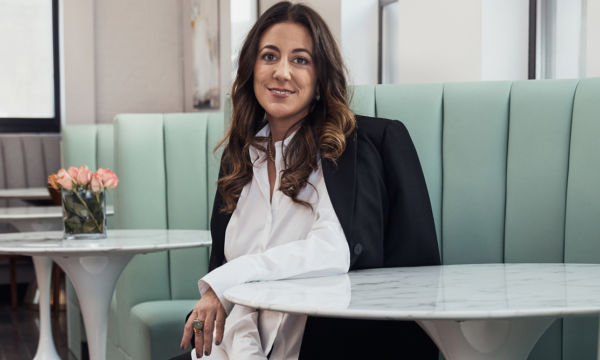Valerie Silensky on Marathons, Money Laundering, and Fighting Financial Crime
June 02, 2017 | Filed in: Woman of the Week
We first got in touch with Valerie Silensky after she wrote an op-ed in the Washington Post about our D.C. showroom‘s lack of plus-size offerings. We reached out to let her know that our First Addition pieces were coming soon, and that we hoped she’d be one of the first people to try them on. As we exchanged emails and learned more about Valerie’s life and career, we realized she was more than a potential new customer—she was true Woman of the Week material. When she isn’t jetting around the world for her job at the State Department, she runs marathons and fosters hospice dogs with her husband (they currently have six!). Here, she talks about learning to investigate, career hiccups, and following the money.
I WANTED TO BE A PRIVATE DETECTIVE when I was little, which is funny because I wound up being an investigator for the government for a few years. I’ve found that a lot of things come full circle, and little stray threads get tucked back into life’s fabric later on—at least that’s how it’s been for me.
I’M AN ONLY CHILD, and my parents were both New Yorkers who loved to travel. They exposed me to everything you could be exposed to in western Massachusetts, where I grew up. It was different there in the 1970s; there was only one science museum, and limited places to send your kid to study languages, but my parents made sure I got to do all of it. They raised me with the mindset that when you’re presented with an opportunity, you should take advantage of it. In my opinion, you only pass this way once, and you might as well.
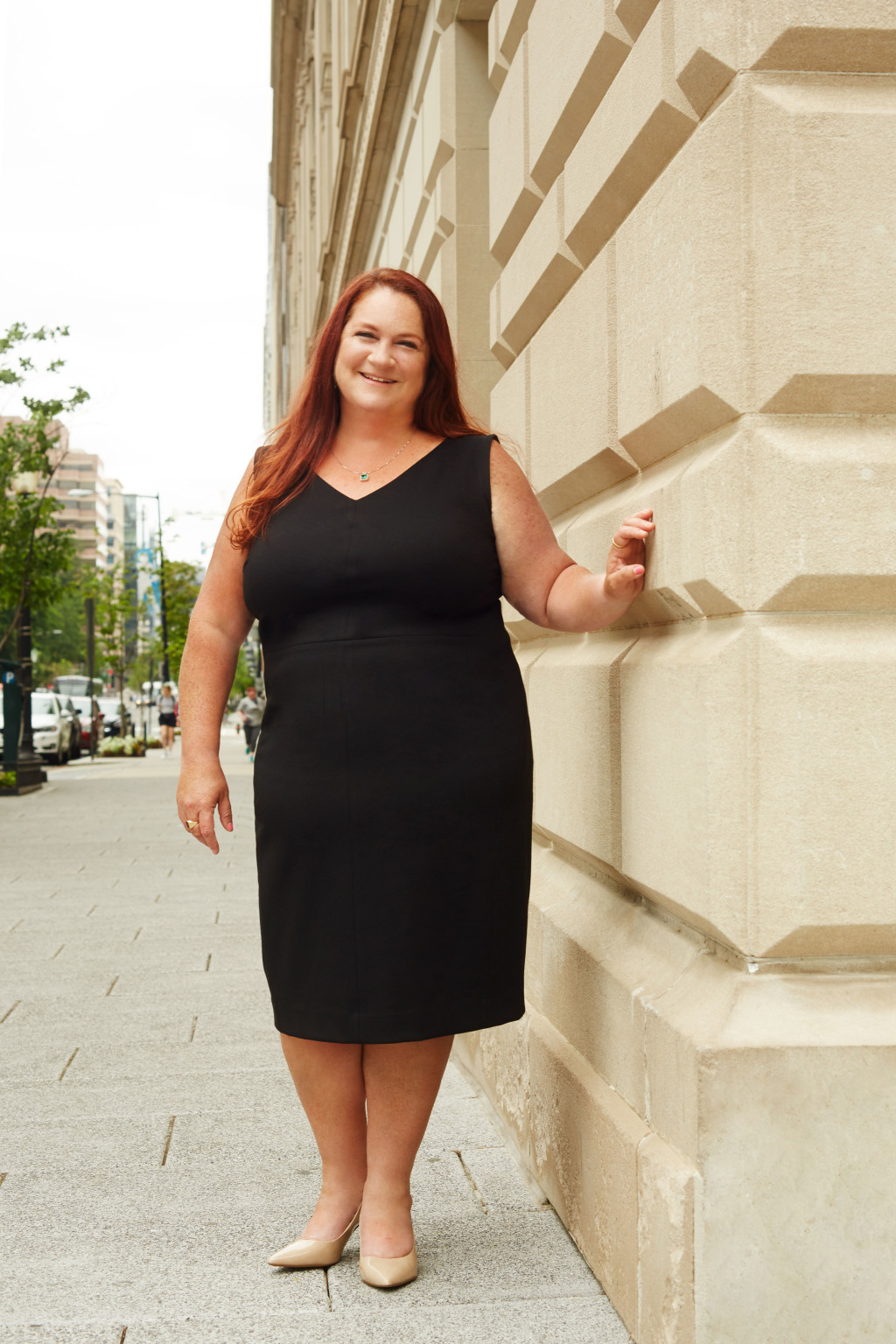
Valerie wears the Rachel dress in black.
I WENT TO CORNELL for undergrad. I was a government major, which is the equivalent of political science, with a concentration in European Studies. I did my junior year abroad in Hamburg, Germany, and it was an incredible time to be there. I graduated in ‘93, so the Berlin Wall had just come down, and Germany was being reunified. The coup with the Soviet Union happened right before I arrived, and a lot of the Bosnian War was going on I while was there. Now you think, “European Studies, that’s so vanilla.” But back then, Europe was a giant shaker blender bottle. I always knew I wanted to be involved in international work, but that year in Germany solidified it. From there, I went to Georgetown for graduate school, and studied foreign service with a concentration in international development.
GOING INTO THE PEACE CORPS was very much a career decision for me. I wanted to come out with a fuller understanding of international development and how it worked from a grassroots end. I was stationed in Ghana, which was in a very different economic position than it is now. I was in a rural village with two wells, one pit toilet, and a river that most people drank from that was rife with diseases. There was no electricity. A lot has changed since then. We were working on water and sanitation, but it turned into more than that—I also helped with financial literacy for some of the women. Ultimately, I couldn’t parlay that into a career, and I’m still somewhat envious of my friends from the Peace Corps who did, and have spent their whole lives in places like Kampala.
MY FIRST JOB after the Peace Corps was at a division of the Department of Labor that works with the integrity of labor unions. The bulk of my work was investigating allegations of embezzlement, or misappropriation of union funds. That was fun, and it formed the basis for my career. It was all about following the money: looking at bank statements, getting witness statements, testifying before grand juries and in court, and working with assistant U.S. attorneys to put together cases—pretty interesting stuff.
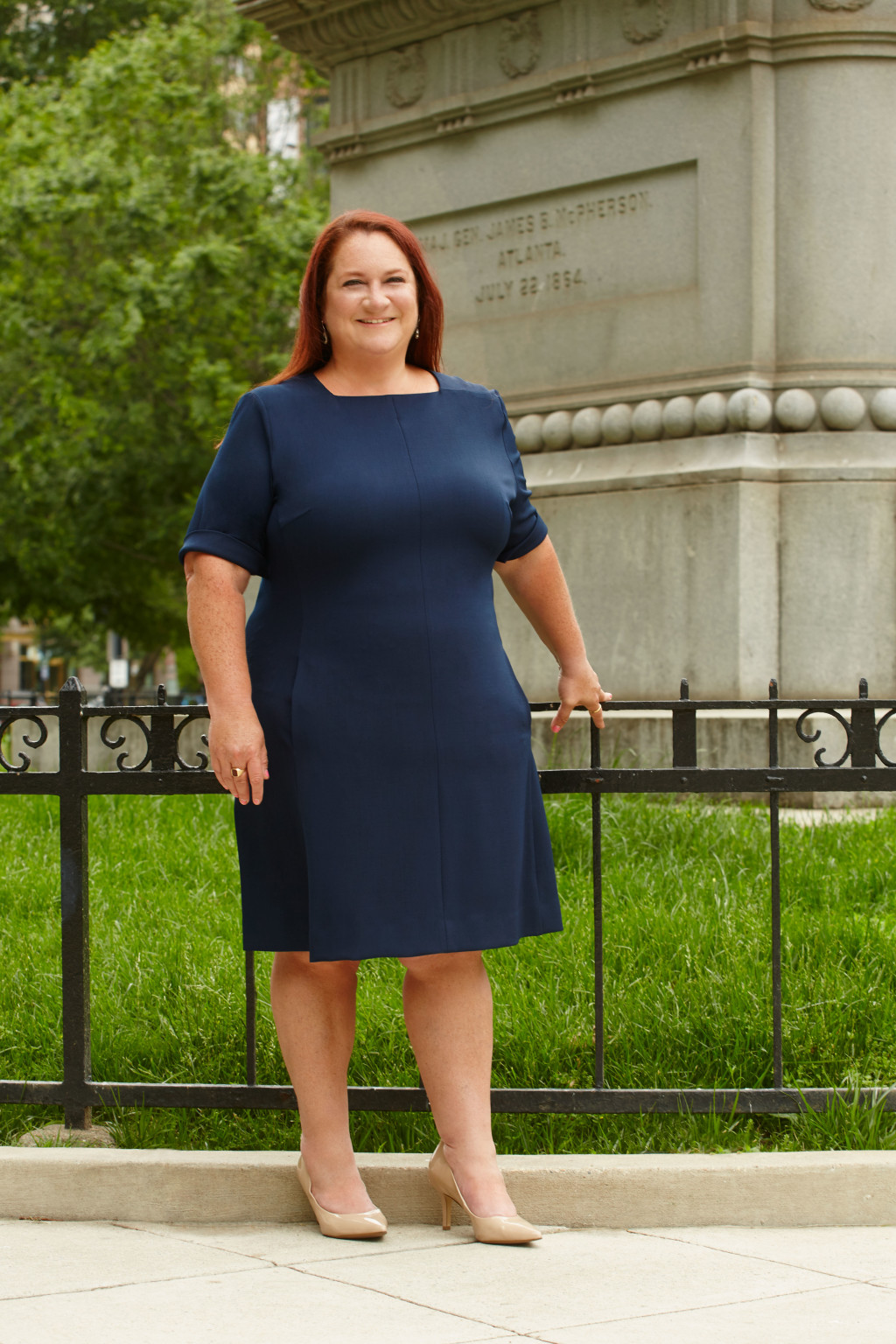
Valerie wears the Emily dress in galaxy blue.
A LOT OF INVESTIGATING is just about connecting with people, and getting them to tell you things. I tend to be a big-picture person, and following money is like putting together a puzzle. I remember poring over hundreds of pages of check registers and trying to match them up with statements, and that intrigued me. You always hear stories where there’s no good guy, but in these cases, we were usually dealing with people who don’t have much—workers who were giving money to the unions because they were trying to make things better for their families. When someone tried to exploit them, it made me so angry. How do you not want to help those people? I don’t care if it’s $5,000 over five years; that’s money those people didn’t have, and it becomes personal, in a way.
I WANTED A JOB with more of an international component, so I took a position at the Treasury Department, at the Financial Crimes Enforcement Network. It’s this small agency that nobody had ever heard of until Ben Affleck made a movie about it last year, The Accountant. Working at FinCEN is what started the anti-money laundering, counter-threat work that I’ve been doing for the past two decades—following a few thousand dollars in 50-person unions progressed to stopping drug traffickers and criminals and terrorists. It’s taken me all over the world.
THEN, IN A VERY BRIEF CAREER HICCUP, I left it all because of a crappy commute, and spent about seven months in Nevada as an agent at the Gaming Control Board. After September 11, things in D.C. went a little bit off the deep end; I had to get my car searched when I drove to work in Virginia every day, which got annoying. Plus, the traffic here is terrible. My husband and I were newlyweds, and we were like, “This sucks.” So we started looking for opportunities elsewhere, and that led us to Nevada. I would always rather regret having done something than regret not having done something—if it bites me in the butt, so be it. And that’s what happened here. Socially and professionally, it was a stall. The workplace was a very difficult environment to function in, as a female. They thought I was an East Coast northerner with a big mouth—and yes, I was. So we came back to D.C., and that’s when I started working for the State Department in the counter-money laundering, counter-financial crime realm again.
I STARTED RUNNING MARATHONS relatively recently; I switched from swimming to running a couple of years ago. I’m not very good at it—it doesn’t come naturally to me, but that’s part of why I wanted to do it. Now it’s a major part of my life. Long distances are also good for me because I go slowly.
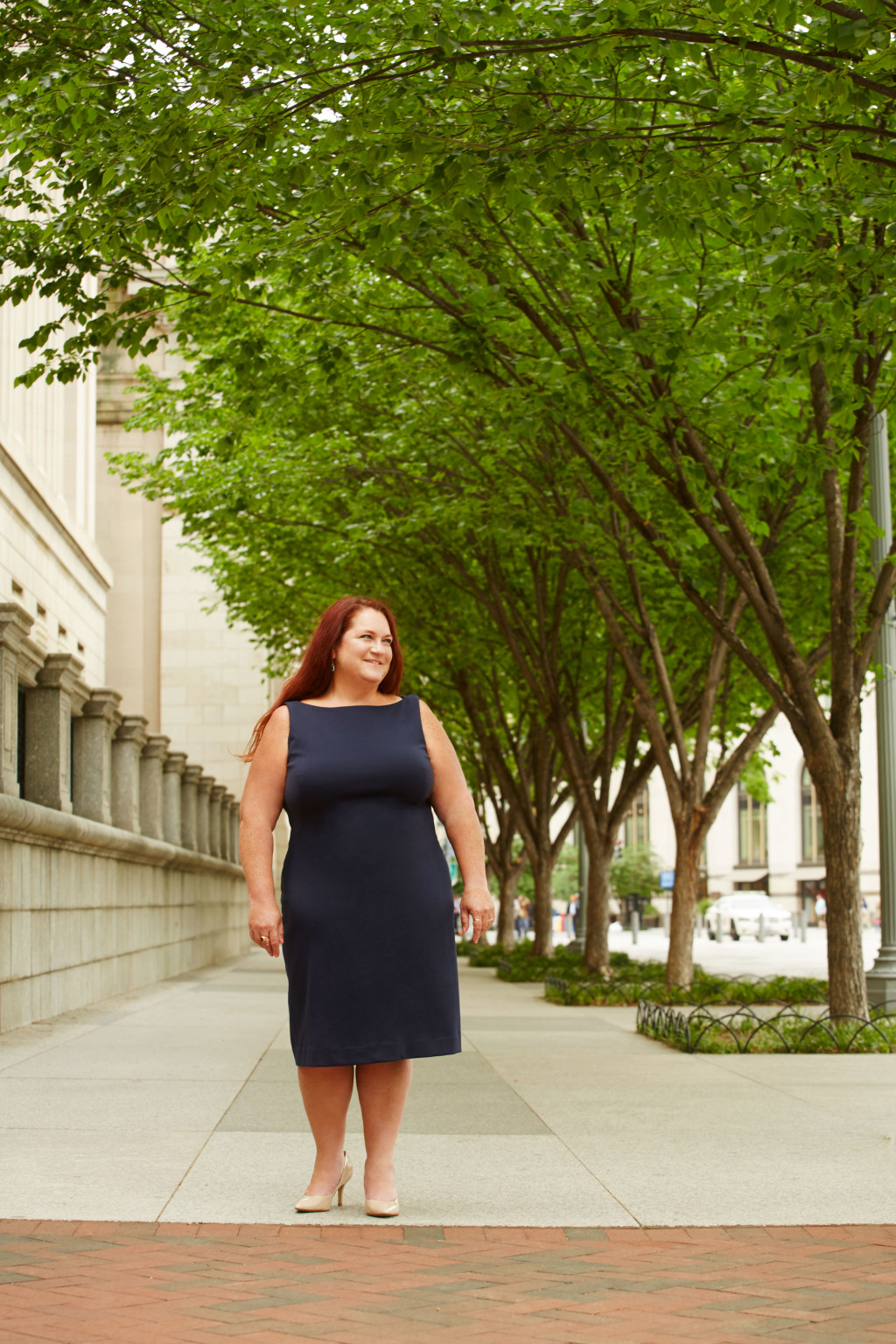
Valerie wears the Lydia dress in galaxy blue.
WHEN I’M OVERSEAS, I always try to do what everybody else does. If everyone takes the metro in Mexico City, then I take the metro in Mexico City. If everybody is eating schwarma on the street at 3:00 a.m., then I’m going to do that, too. It’s an interesting social strategy, but when you’re working, immersing yourself for a week or two gets you so much farther. If you don’t disappear off to your hotel room all the time, your colleagues get to know you, and they trust you more. The whole international cooperation aspect is so satisfying. I’m not really one to separate the personal from the professional, and some of the relationships I’ve built over the years have become immensely fulfilling.
AS WOMEN, WE’RE TAUGHT to be cognizant of how much space we take up. For men, taking up space is power—you’re manspreading, and you want the big office. I’m sensitive to that, and I will spread right back. From a physical perspective, I do believe there’s such a thing as “thin privilege.” When you’re thin, or the size that society perceives as “normal,” you don’t think about people making certain assumptions about you based on your size. When you’re not thin, you have to work harder to get a job. Professionally, you have to wow people with everything else to overwhelm the fact that when you walk into an office, they’ll be like, “Oh, you’re fat.” There’s this mental calculus involving my body that I’m not even aware I’m doing sometimes, and it does take up energy that I’d rather spend elsewhere. When I go to lunch and everyone else is eating a salad, but I ran 20 miles yesterday and I need protein, what will they think if I order steak? Why do I care, and what does it matter? And why is it that when I go to a department store, I have to go to a special section called “Women’s World,” or whatever euphemism they use—does that mean that if you’re a smaller size, you’re not a woman? Where does the stigma stop?
IN TERMS OF CLOTHING, I tend toward straight dresses and sheaths. It’s also important that things pack well and don’t wrinkle. A dress is always easy; you can pair it with a jacket or different scarves. I like things that don’t require a lot of thought, because I don’t have many thoughts when it comes to clothes. I spent far too many years buying things because they looked cute on the mannequin, or they were on sale, and I’d bring them home and then spend an hour before work going, “I have nothing to wear.” To me, MM.LaFleur’s clothing represents getting away from that. I’d rather have fewer pieces that match each other, so that I know I can walk into my closet on any day and look good and feel confident.
Photos by Maria Karas.






